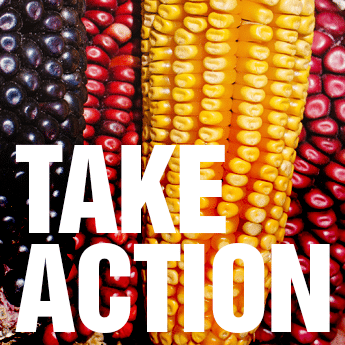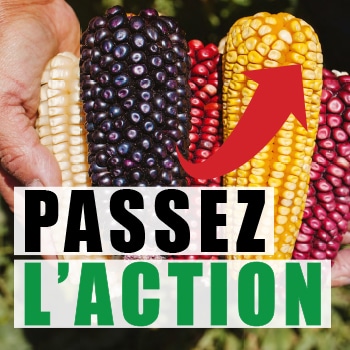Désolé, la version française de cette page ne peut être offerte pour le moment.
Corporate Public Relations
The largest seed and pesticide companies in the world – Bayer (acquired Monsanto), Syngenta (now owned by ChemChina), and Corteva (DowDuPont) – are funding various public relations programs to promote public acceptance of their genetically engineered seeds and agrochemicals. These three companies are the top seed and agrochemical companies in the world.
Bayer, the largest seed, biotechnology and pesticide company in the world, started a “Cultivating Trust” program that led to the establishment of the industry-funded website “GMO Answers“. However, rather than just directly promote their products themselves, Bayer and other corporations are also funding other groups and projects to speak out about the benefits of biotechnology and agrochemicals. In Canada, many of these communications initiatives are part of a new national agri-food industry “social license” campaign that is designed to gain public trust in corporate seeds and chemicals.

Funders of the website “GMO Answers”
Between 1997 and 2003, the Government of Canada spent $13 million on public communications about biotechnology including a booklet called “Food Safety and You” which was sent to every household in Canada, at a cost of $2.5-million. Read about the government public relations efforts in CBAN’s GMO Inquiry report (2015) “Are GM Foods Better for Consumers?” or click here to see some of the archived public communications documents from government, consumers groups and industry.
Seeking Public Trust for “Social License”
May 19, 2021 – Agriculture Canada funding for the industry social license campaign: The Minister of Agriculture and Agri-Food has announced “an investment of over $244,000 to support the Canadian Centre for Food Integrity’s (CCFI) work to build public trust in Canada’s food system. The announcement followed Minister Bibeau’s meeting with several members of the organization…Members of the CCFI include Syngenta, Bayer, BASF and Corteva. The investment will support activities like creating new content for CCFI’s It’s Good Canada website. Agriculture and Agri-Food Canada says, “By sharing accurate, transparent information about Canadian food production, CCFI will increase trust in the Canadian food system and in those who produce the food that Canadians eat and enjoy.” from the Press release: Minister Bibeau announces investment to strengthen trust in Canadian agriculture.
May-June, 2021 – Health Canada discussions with industry lobby about public relations website to promote gene editing: Health Canada initiated a March 8, 2021 meeting with the pesticide and biotech industry lobby group CropLife Canada, “To discuss Health Canada’s voluntary transparency initiative on non-novel gene edited plants and the ‘Nature Nurtured’ industry initiative”. This follows February 19, 2021 correspondence with CropLife Canada where the Acting Associate Assistant Deputy Minister, Health Products and Food Branch, stated of the Nature Nurtured site that, “It is clear that this information provides Canadians with clear plain language description of the technology and its potential benefits. These elements are valuable in allowing Canadians to understand the technology and its use in agriculture.”
- On May 18, 2021, CBAN wrote to Health Canada to express our concern about discussions between Health Canada and the biotechnology and pesticide industry lobby group CropLife Canada in relation to their public relations website “Nature Nurtured”.
- On May 28, 2021, Health Canada responded that “Health Canada will not, in any way, promote or rely on this website…Health Canada will continue to provide impartial information to Canadians through our website and seek ways to increase the transparency of the regulatory system within the limits of our authority.”
“The Problem: The social license, the freedom to operate that we, the Canadian agri-food industry, has enjoyed is at risk… this risk could intensify as a growing group of stakeholders raise questions about whether today’s food system is worthy of public trust; as new technologies are introduced; and as the connections between consumer and industry dissipate” – Canadian Journey to Social License, A Pre-May 31 Session Discussion Document, 2016
“Public fears about food safety are putting pressure on government and decision makers to restrict the approval of GM foods…and to ban the use of certain pesticides. Canada’s food certification process is already one of the strictest in the world but will it become so restrictive that farmers will lose their choice about how they manage their crops. Canadian farmers have never before faced a challenge of this magnitude.” – from the film License to Farm, 2016 – see also the related story “Government funds video to help farmers combat anti-GMO movement“, CBC, January 20, 2016.
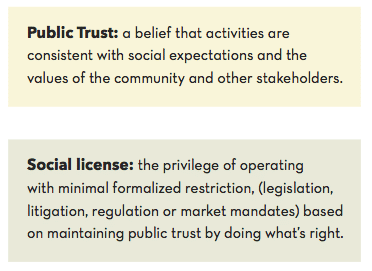
Common definitions. Source: Canadian Centre for Food Integrity
In 2016, Agriculture and Agri-Food Canada invited stakeholders to participate in five “National Social License” consultations across Canada organized with seed, pesticide, and food companies as well as commodity groups and farmer associations. Agriculture and Agri-Food Canada said, “Coming out the Federal-Provincial-Territorial (FPT) Agriculture Ministers meetings July 2015 there was a significant amount of interest by government and industry regarding social license/public trust.”
“Ensuring Canadians have trust in the agricultural sector is key to its continued economic growth and long-term prosperity. The Government of Canada is committed to helping the sector better understand Canadians’ perceptions related to food and the food system so it can continue to meet the needs of the population while maintaining consumer confidence.” – Agriculture and Agri-Food Canada, Press Release, November 14, 2018
House of Commons Standing Committee on Agriculture and Agri-Food hearings on “Perception of and Public Trust in the Canadian Agricultural Sector” 2019
March-June 2019: The House of Commons Standing Committee on Agriculture and Agri-Food undertook “a study on the public perception of the Canadian agriculture and agri-food sector. The Committee would like to understand the challenges and opportunities for the sector, measures taken by industry and government to improve public trust, and what other measures should be taken. The Committee would also like to open up the conversation between farmers, ranchers and producers and the civil society to break down the silos that persist in the agricultural sector.”
- Rather than conclude the study with a report and recommendations as expected, the Committee sent a letter to the Minister of Agriculture and Agri-Food, inviting her to review the testimony and briefs provided to the Committee.
- CBAN testified on April 4, 2019. Click here to read our brief submitted to the Committee.
- Click here for transcripts, audio of testimony, and briefings in the hearings.
Corporate Funding
On September 18, 2018, CBAN Coordinator Lucy Sharratt participated in the TV panel show The Agenda with Steve Paikin from public broadcaster TVOntario (TVO), to discuss the new genetic engineering techniques of gene editing. Lucy pointed out, on-air, that the other three panel members all shared corporate funding from Bayer and Syngenta: representatives from The Canadian Centre for Food Integrity, CropLife Canada, and the “Industry-Funded Agri-Food Innovation Chair” at the University of Saskatchewan. CBAN had informed the show about this shared funding well in advance of the program and had repeatedly requested that the funding sources be disclosed to the audience.
Update: On March 5, 2019 TVO broadcast a show about the influence of industry funding on research outcomes, to address the concerns raised by CBAN. Click here to read our summary and for a link to watch the show.
Canadian Centre for Food Integrity
The Canadian Centre for Food Integrity is a new non-profit organization funded by the companies Bayer, Corteva, and Syngenta and other agricultural and food companies. Its mission is “to help Canada’s food system earn trust” and its vision is “to be Canada’s recognized service provider in food system trust collaboration.” It is affiliated with a US group of the same name, it is a division of the Canadian group called Farm & Food Care, and hosts annual “Public Trust Summits.”
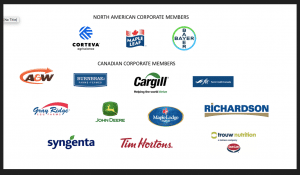
Corporate Members of the Canadian Centre for Food Integrity
- The Canadian Centre for Food Integrity and the Center for Food Integrity (US) host the website Best Food Facts which provides recipes and fun facts (like “How were popsicles invented?), along with videos that promote new genetic engineering (gene editing) techniques and the opportunity to send your question to their experts to answer.
- In November 2018, Agriculture and Agri-Food Canada provided $190,000 to the Canadian Centre for Food Integrity to implement “digital ethnographic and social methodology research to understand the priorities for Canadians related to the food system.”
“Our Government is proud to support the Canadian Federation of Agriculture and the Canadian Centre for Food Integrity in their efforts to advance public trust in the food industry. The funding we announced today will help the sector to better understand what Canadians believe and value about the food they buy and eat, which in turn will help our industry continue to meet demand while maintaining trust and confidence in Canada’s world-class production standards.”
– Parliamentary Secretary to the Minister of Agriculture and Agri-Food, Nov 14, 2018
Industry-Funded Agri-Food Innovation Chair, University of Saskatchewan
“The funding for this position has been provided by firms and organizations within the Canadian agricultural industry. Specifically, the investing partners are: Bayer CropScience Canada, CropLife Canada, Monsanto Canada, the Saskatchewan Canola Development Commission (SaskCanola) and Syngenta Canada.”

Agri-Food Innovation Chair Industry Sponsors, University of Saskatchewan
The Chair is currently held by Dr. Stuart Smyth, Associate Professor in the Department of Agricultural and Resource Economics: “The objective of this Chair is to address the problems regarding the use of regulations as international trade barriers that have the very real probability of negatively impacting food security by restricting developing country farmers from accessing the full variety of tools possible. The research undertaken in the Chair will provide the industry with research from a neutral perspective, but one that will hold industry interests as a priority. Funding provided by industry sponsors offers Dr. Smyth, the Chair of Agri-Food Innovation, to lead research and improve the understanding of new crop genetics by focusing on the core issues of governance, regulation and trade in order to add value to the genomic sciences.” [emphasis added] Click here for details.
For more information on corporate ties and messaging, see Stuart Smyth’s agrichemical industry ties and funding, U.S. Right to Know, June 1, 2020.
CropLife Canada
CropLife is the lobby group for the biotech, seed and pesticide companies: “Representing the developers, manufacturers and distributors of plant science innovations – pest control products and products of modern plant breeding.” Its members include Bayer, BASF, Corteva and Syngenta as well as the GM apple company Okanagan Specialty Fruits and the GM potato company Simplot.
“Our objective: Strategically engage new audiences to broaden public confidence and further increase public acceptance of plant sciences and the use of CropLife Canada members’ products in modern farming.” – Presentation, “Public Trust – is progress possible?” Nadine Sisk. Vice-President, Communications and Member Services, CropLife Canada, 2018.

CropLife developed a series of films called Real Farm Lives with the international marketing and public relations agency Edelman, to increase public acceptance of “the use of CropLife Canada members’ products.” Read about it in the article Family farm documentary was part of pesticide lobby’s campaign to change how you think, Carl Meyer, National Observer March 27 2019.
Corporately Funded School Programming
“Ag in the Classroom”
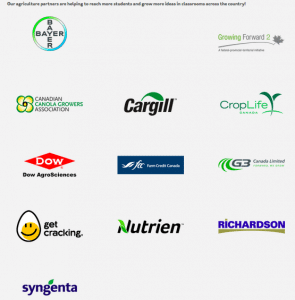
Agricultural Partners of “Ag in the Classroom”: “Our agricultural partners are helping to reach more students and grow more ideas in classrooms across the country!”
Agriculture in the Classroom Canada (AITC-C) is “the national voice for agriculture education in Canada” and is funded by the corporations Bayer, CropLife Canada, Syngenta, Corteva and Cargill, as well as commodity groups Canadian Canola Growers Association and the farmer-led Egg Farmers of Ontario, and the federal government.
It “exists to help students across the country understand and appreciate how diverse agriculture truly is – and our work would not be possible without the generosity of our partners. Our partners play a vital role in expanding agriculture education opportunities for all kids. Their donations, ideas, volunteer power, and in-kind support are helping grow understanding and curiosity in students across Canada. Our agriculture partners are helping to reach more students and grow more ideas in classrooms across the country!”
“As Canada’s agriculture and food story grows and changes, public trust is more important than ever. AITC-C believes that agriculture and food education and connecting with young Canadians is one of the integral keys to building this trust.” – Annual Report 2017
“We often have teachers and even high school students give us a call and say, “You know I’ve heard about these hot topics, like what are GMOs? What does biosecurity really mean?…” – Johanne Ross, Executive Director for AITC-C, August 2018
The Canadian Centre for Food Integrity is a “strategic partner” of Ag in the Classroom.
Example: Ag in the Classroom Markets the GM Apple to High School Students, 2017
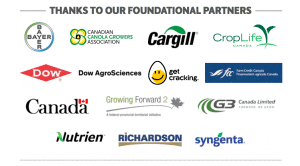
Foundational Partners of “Ag in the Classroom”
Ag in the Classroom invited teachers and students across Canada to a live webinar on March 7, 2017 called “Trashing Food Waste with Technology” that was actually a promotion for the newly approved genetically engineered non-browning “Arctic” apple.
CBC reported that “Johanne Ross, executive director of Agriculture in the Classroom, said she thinks the coalition is misunderstanding the content of the live streamed webinar. She said the focus is reducing food waste to improve the environment and increase food availability. The focus is not genetically modified food or the Arctic Apple, Ross said.” However, the webinar speaker was Jessica Brady, who is a marketing and communications staff person at the GM apple company Okanagan Specialty Fruits and the the pre-webinar lesson plan for teachers instructed students to: “Explore the website to learn more about Arctic Apples – this will be the focus of the live stream event you and your class will be watching.” Read the story in The Western Producer, March 23, 2017.
- Webinar Materials: All webinar lesson plans and advertisements are linked here.
- Background: For details on the webinar see CBAN’s Bulletin Biotech Companies Promoting GM Apple to High School Students.
- Press Release – March 5, 2017: Corporations in the Classroom: Groups alert Ministers to GM product placement disguised as education.
- Letter to Ministers – March 5, 2017: RE: Product placement in the classroom in March 7 Live Webinar.
- Press Release – March 3, 2017: Groups warn of corporations promoting genetically modified products in schools this March.
AgScape, Ontario
“As the voice of Agriculture in the Classroom Ontario, AgScape provides factual, balanced, curriculum-linked food literacy programs and resources to Ontario’s educators and students.”
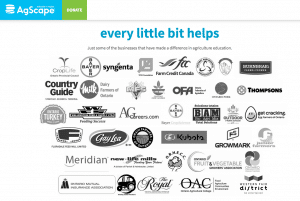
Donors to AgScape, Ontario’s voice of “Ag in the Classroom”
Vision: “A world where the agri-food sector is recognized as a vehicle for positive social, economic, and environmental impact.” Mission: “We empower Ontario students with impartial and accurate information to increase awareness of the agri-food system and ignite interest in related careers.” AgScape exists because “Lack of consumer knowledge about food and farming systems is a contributing factor to the economic challenges facing Ontario’s agri-food industry; Myths about food and farming constantly challenge the growth and progress of the agri-food industry; Educating students about food and farming can help dispel myths, create a deeper interest and connection to food, and promote local (Canadian) food; There is a disconnect between the agri-food industry and consumers; Agriculture is currently not recognized as a separate subject within the Ontario curriculum.”
AgScape board members include representatives from Monsanto and Syngenta as well as representatives from the Beef Farmers of Ontario, the Dairy Farmers of Ontario, and the Government of Ontario.
Action: Court case challenges University of Saskatchewan redaction of meeting minutes on GM communications
According to documents obtained by the group U.S. Right to Know, professor Peter Phillips, graduate chair at the University of Saskatchewan Johnson-Shoyama Graduate School of Public Policy, was one of several agriculture experts solicited to write articles by a senior Monsanto executive in 2013. A public relations firm hired by Monsanto emailed Phillips and others to give them proposed deadlines and inform them of efforts to disseminate the papers. In December 2015, professor Peter Phillips and Monsanto publicist Cami Ryan organized an invitation-only symposium was held at the University of Saskatchewan called “Research Management and the Right  to Know”. The twenty attendees included members of the university administration, select faculty, communications personnel and representatives from industry.
to Know”. The twenty attendees included members of the university administration, select faculty, communications personnel and representatives from industry.
Action concluded: “Stop the University of Saskatchewan Monsanto Cover-up”
- A group called Academic Integrity requested the proceedings of the symposium through the legislated freedom of information processes but the papers provided to them were 85% redacted (blanked out).
- The group then made a request for review to Saskatchewan’s Information and Privacy Commissioner, who determined that most of the redactions were unlawful and recommended that the University lift most of the redactions to make the transcript more publicly accessible.
- The University did not comply and the group began legal proceedings.
- In April 2019, the group Academic Integrity presented their petition (now closed), signed by over 1800 people, asking the University of Saskatchewan Chancellor to “intervene to stop administration obstruction of the freedom of information commissioners recommendations”. Click here for video of the group explaining their efforts.
- A judgment handed down from Court of Queen’s Bench on May 21, 2019 largely found in favour of the University of Saskatchewan.
- In July 2019, the group announced that, due to prohibitive costs, they would not appeal their unsuccessful lawsuit against the University of Saskatchewan.
Cornell “Alliance for Science”
“Through its funding for the Cornell Alliance for Science, the Bill and Melinda Gates Foundation is seeking to shape public opinion in favor of adopting GMOs and corporate agriculture.” – Heather Day, AGRA Watch, from the article Messengers of Gates’ Agenda: How the Cornell Alliance for Science Spreads Disinformation on behalf of the Bill and Melinda Gates Foundation, 2020.
Report: Messengers of Gates’ Agenda: A Case Study of the Cornell Alliance for Science Global Leadership Fellows Program, AGRA Watch, 2020.
Investigation: Cornell Alliance for Science is a PR Campaign for the Agrichemical Industry, U.S. Right to Know, October 2018. Funded by $12-million from the Gates Foundation, the Cornell Alliance for Science says it is working to “restore the importance of scientific evidence in decision-making”.
Other Resources
- Tracking the Agrichemical Industry Propaganda Network, U.S Right to Know, April 2019. Catalogue of investigations into organizations and spokespeople.
- Glyphosate Spin Check: Tracking Claims About the Most Widely Used Herbicide, U.S Right to Know, April 2019. Includes brief notes on the funding behind some prominent organizations and spokespeople.
- Bayer’s Shady PR Firms: FleishmanHillard and Ketchum, U.S. Right to Know, May 2019. The Government of France is investigating the tactics employed by these PR companies.
- Cornell Alliance for Science is a PR Campaign for the Agrichemical Industry, U.S. Right to Know, October 2018. Funded by $12-million from the Gates Foundation, the Cornell Alliance for Science says it is working to “restore the importance of scientific evidence in decision-making”.
- The Public Trust PR Campaign: Agribusiness efforts to avoid public regulation, National Farmers Union, May 2017.


